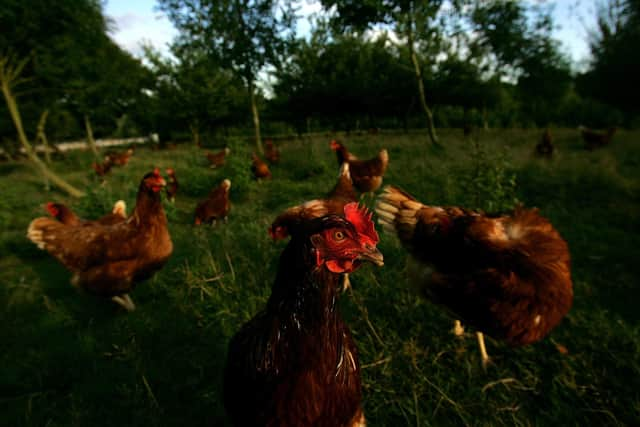Caged farm animals: A million hens are thought to be crammed into cages in Scotland. This must end – Philip Lymbery
How many of us realise that lurking behind a box of ‘fresh’ eggs might be a tale that is far from ‘sunny side up’? Despite years of progress, there is still a stubborn rump of the egg industry pumping out eggs from battery-caged hens. But thankfully, that could be about to change.
In a groundbreaking move, the Scottish Government has announced that it is considering banning the keeping of egg-laying hens in cages. This drive to ban cages reflects a demand from society to move to more ethical production systems. Recent opinion polling found that 88 per cent of the British public believe using cages in farming is cruel and more than three-quarters want it banned.
Advertisement
Hide AdAdvertisement
Hide AdThe public’s condemnation of cages has already been heard by most major supermarkets in the UK, with The Coop, M&S, Morrisons, Sainsbury’s, and Waitrose stocking only cage-free eggs on their shelves. Aldi, Asda, Lidl, and Tesco are set to do the same by next year. Yet over a million hens are still thought to be caged in Scotland (ten million in the UK) with the eggs going into the food chain either in boxes or as an ingredient for ready meals, etc.


I’ll never forget stumbling across an official internet video by a company selling cages, which for me said it all. It showed five chickens in a wire cage not much bigger than a microwave. Their beaks had been cut to ugly stumps. The camera then cut to a wide shot of an endless row of cages. The confinement was claustrophobic. Gobsmacked, I thought I was inadvertently watching footage from an activist group. But no, this was an industry promo video. The chickens’ suffering was palpable.
Freedom to act normally
Which is why the Scottish Government announcement is so important. If implemented, the cage ban would be another example of Scotland leading the way in improving the welfare of animals by being the first UK nation to ban the practice.
It comes off the back of a 2021 commitment by the European Commission to ban all cages for animals farmed for food. This was in response to more than a million signatures on an official petition calling for an “end to the cage age” in farming. Cages are already banned in Austria and Luxembourg, with several other EU countries including Germany, set to follow suit.
The Scottish Government has restated its commitment to “improving the welfare of laying hens by addressing the issue of confinement, so that birds have the freedoms to exhibit their normal behaviours”.
Serious about sustainability
I’ve long said that banning the caging of animals for food is the first thing we should be doing if serious about a sustainable future. The use of cages is a symbol of all that is unsustainable in farming these days. And getting food and farming back on a sustainable footing is vital if we are to save the future for our children.
Which is why I applaud this consultation and encourage the Scottish Government to act quickly to end the cage age, and look to other governments, not least Westminster, to follow suit.
Philip Lymbery is chief executive of Compassion in World Farming, a former United Nations Food Systems Champion and an award-winning author. His latest book is Sixty Harvests Left: How to Reach a Nature-Friendly Future. Philip is on Twitter @philip_ciwf
Comments
Want to join the conversation? Please or to comment on this article.
